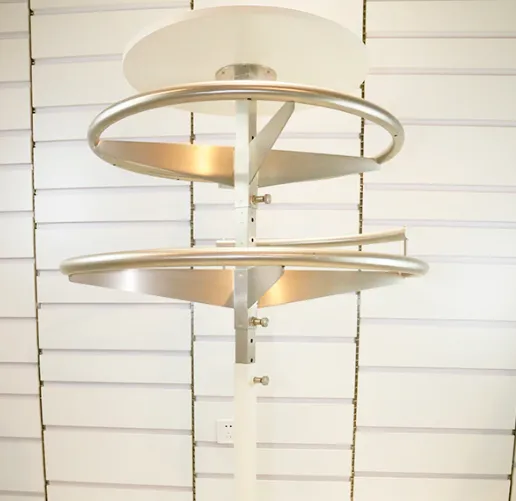- 150m meridiem, West DingWei Road, Nanlou Villa, Changan Urbs, GaoCheng Area, Shijiazhuang, Hebei, China
- monica@foundryasia.com
Jul . 21, 2025 13:48 Ad album
How to Find the Right Shop Fittings Store
Opening a new retail store? Expanding your space? Redesigning your shop layout to boost sales? No matter what stage you’re in, the one thing you can’t afford to overlook is your shop fittings.
Well-designed fittings do more than display your products—they shape the customer journey, reinforce your brand, and make your space work efficiently. Whether you’re sourcing from a local shop fittings store, looking for complete shop fittings packages, or need portable mobile shop fitting systems for temporary retail, choosing the right setup is a game changer.
Let’s break down what’s available, how to choose what fits your business, and why working with the right supplier makes all the difference.

What Is a Shop Fittings Store?
A shop fittings store is a specialized supplier that provides everything retailers need to set up a functional and attractive commercial space. Think of it as your one-stop shop for:
Shelving systems
Counters and cash desks
Display racks and tables
Slatwalls, pegboards, and gridwalls
Garment rails and mannequins
Lighting, signage frames, and accessories
These stores cater to a wide range of businesses—from fashion and electronics to food, cosmetics, and pop-up brands. Some also offer installation and layout planning services to help you make the most of your floor space.
What Are Complete Shop Fittings?
Complete shop fittings refer to full-package solutions that outfit an entire retail store from front to back. Instead of sourcing fixtures one at a time, you get a coordinated system that includes everything needed for:
Product display
Backroom storage
Customer service areas
Branding and signage zones
Lighting and layout flow
Complete shop fittings are ideal for:
New store openings
Franchises and chains seeking consistent design
Businesses going through a full rebrand or refurbishment
A good supplier will also provide 2D/3D store layouts, material boards, and guidance on building codes and accessibility.
Mobile Shop Fitting: Flexible Retail, Reimagined
Not all stores are fixed in place. Pop-up shops, markets, exhibitions, and seasonal events all call for flexibility. That’s where mobile shop fitting comes in.
These are portable, lightweight, modular display systems that are easy to:
Transport
Assemble and disassemble
Reconfigure for different layouts
Store compactly between events
Mobile shop fitting is commonly used for:
Trade shows and expos
Farmers’ markets and food trucks
Seasonal mall kiosks
Traveling brand activations
Temporary in-store promotions
They’re typically made of aluminum, lightweight wood composites, or reinforced plastic. Some even come with built-in wheels or foldable panels for ultra-fast setup.
How to Choose the Right Shop Fittings Store
When looking for a reliable shop fittings store, consider the following:
1. Range of Products
Do they carry both classic and modern fitting options? Can they serve your niche (e.g., fashion, electronics, food, etc.)?
2. Custom Solutions
Can they design bespoke fittings for your brand or modify standard items to fit your space?
3. Installation Services
Do they offer delivery, installation, and layout guidance, or just sell parts?
4. Lead Time and Stock Availability
How quickly can they fulfill your order? Do they offer in-stock options or custom fabrication?
5. Previous Work or Case Studies
Any proof they’ve outfitted shops like yours before? Check for photos, testimonials, or referrals.
Benefits of Going with Complete Shop Fittings
Efficiency: Save time by sourcing everything from one place
Design Consistency: Ensure a cohesive look and brand alignment
Bundled Pricing: Package deals often reduce total cost
Professional Planning: Avoid trial and error with layout, flow, and compliance
Faster Launch: Speed up store openings or refits
Who Needs Mobile Shop Fitting?
If your business moves—or needs to be able to—then mobile shop fitting is a smart investment. It’s perfect for:
Retailers testing new markets
Startups doing trade shows
Direct-to-consumer brands going offline
Artisans and vendors at festivals or fairs
Brands with frequent promotions or layout changes
These setups allow you to stay agile, reduce overhead, and create professional presentations anywhere.
Final Tip: Plan Before You Buy
The biggest mistake store owners make? Buying fittings before planning their layout. Work with your shop fittings store to map traffic flow, display zones, sightlines, and customer journey. It’ll help you get better ROI from your fittings—and boost conversion rates too.
Shop Fittings Store FAQs
Q1: Do shop fittings stores offer layout design services?
A: Many do. Reputable stores often provide floor plans, CAD drawings, or even 3D modeling to help you visualize your space before ordering.
Q2: Can I order complete shop fittings online?
A: Yes. Some stores have ready-made bundles or kits for specific shop types (e.g., fashion boutique package, electronics store kit). Others offer virtual consultations to customize your order.
Q3: How durable are mobile shop fittings?
A: High-quality mobile fittings are made to withstand frequent assembly, transport, and use. Look for systems with metal frames, reinforced connectors, and protective cases for transport.
Q4: Are shop fittings a one-time investment?
A: Not always. Some elements—like shelves and counters—last years, while seasonal or mobile elements may need more frequent updates. Modular systems let you adapt without starting from scratch.
Q5: What’s the average cost for complete shop fittings?
A: It depends on size and materials. Small shops may spend $5,000–$15,000. Midsize retailers often invest $20,000–$50,000 for a fully outfitted space. Custom work increases cost.
-
Square Cast Iron Cookware Picks
NewsJul.21,2025
-
Seasoned Cast Iron Grill For Everyday Cooking
NewsJul.21,2025
-
Preseason Cast Iron Made Easy
NewsJul.21,2025
-
Pre Seasoned Cast Iron for Daily Cooking
NewsJul.21,2025
-
Cast Iron Wok Cooking Power
NewsJul.21,2025
-
Cast Iron Grill Pan For Stovetop Use
NewsJul.21,2025